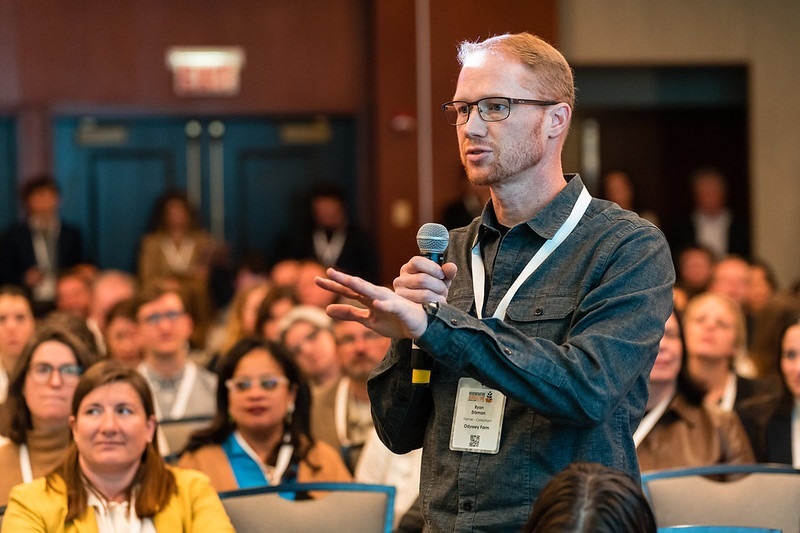As a Marine in Iraq doing counterinsurgency, Ryan Erisman, learned how to work in a hostile environment. Now an organic farmer, Erisman had no problem challenging a different opponent—pesticide company representatives—about the need for their products at the Regenerative Agriculture and Food Systems Summit.
During a question-and-answer segment of the panel session, “Transforming and Innovating Your Business Model,” Erisman, owner of Odyssey Farm , asked representatives from Syngenta, BASF, and Yara North America: “Do you think farms can be regenerative by not buying anything you sell?”
Chad Asmus, sustainable ag product strategist at BASF, said: “Probably not, crop protection and biotechnology have a positive impact on implementing regenerative practices at scale.”
Asmus said not using inputs is possible but it is difficult when farming at larger scale.
Bryan Ulmer, global technical lead-value chain at Syngenta, said: “Moving to regenerative is not black and white. To maintain and improve productivity, inputs will be required.”
Ulmer said his company is investing in biological inputs to manage pests. “We are moving in the right direction,” he said.
“The transition to regenerative agriculture will take time and steps. Maybe you will not need us but our business model is evolving,” said Debbie Watts, vice president of innovation and market development at Yara North America, a supplier of synthetic fertilizers. She acknowledged it was a “great question.”
Erisman, who also served as a Marine in Iraq, responded by saying that his family’s organic farm has been successful for 30 years without using any inputs.
The panel session was one of many educational sessions presented during the two-day Regenerative Agriculture and Food Systems Summit USA held in Chicago in March.
Prior to the exchange, the input company representatives discussed the need to reduce the use of synthetic inputs.
Ulmer discussed the importance of using integrated pest management, a more environmentally friendly approach that integrates both chemical and non-chemical practices to control pests.
“We can’t rely too much on one technology,” he said. “It’s in the best interest to take an integrated approach, which is needed for a long-term approach to sustainability.”
Asmus discussed the importance of diversifying production with crop rotations to break up pest cycles. He said his company surveyed farmers on what they wanted in order to achieve sustainability. “They want products that drive regenerative agriculture. What are the products that build soil health?” he said.
“Clearly this approach needs to adjust. Shipping fertilizer around the world is not sustainable,” Watts said. She also said there should be ways to incentivize growers to achieve other outcomes besides yield and quality.
Asmus said conventional agriculture’s focus on yield has “had some good impacts, but has come at a cost of degeneration of the land. Now, it’s back to regeneration.”
Panel moderator Betsy Hickman, director growth and strategic initiatives, Anthesis, thanked the panelists for coming to the conference even though as she said, “you aren’t the most popular people in the room.”





